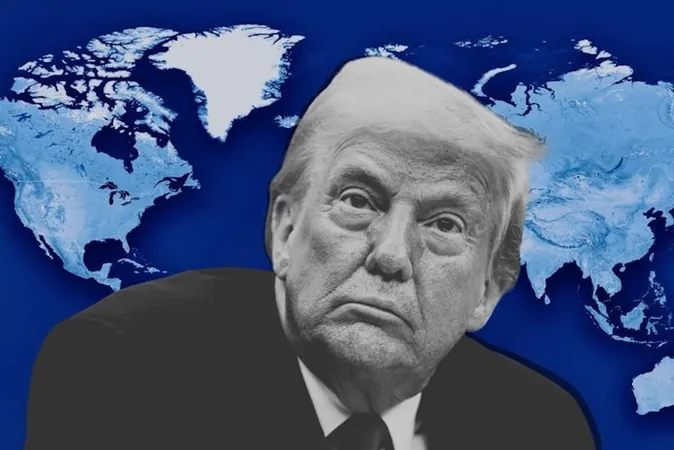
Trump's Tariff Strategy: A Recipe for Global Economic Turmoil?
2025-04-04
Author: Nur
Trump's Tariff Strategy: A Recipe for Global Economic Turmoil?
As the dust settles on Donald Trump’s latest tariff measures, questions loom over whether these aggressive tactics have propelled the global economy toward a recession. With Asian economies bracing for impact, analysts are already sounding alarms regarding the potential fallout from what could be described as the most audacious trade gambit in recent history.
In a stunning turn of events, the U.S. stock market experienced a dramatic plunge, losing approximately $2.5 trillion from the S&P 500 Index within a single day, leading experts like Neil Dutta from Renaissance Macro Research to dub the day “Obliteration Day.” Major financial institutions, including JPMorgan, have already indicated that a recession under Trump's tariff regime is a plausible outcome.
The economic ramifications of these tariffs are expected to be severe. Michael Feroli, an economist at JPMorgan, highlights that the tariffs could inflate prices by as much as 1.5% this year. This would not only impact consumer spending but also put significant strain on personal incomes in the U.S. Any downturn in the American economy is likely to send shockwaves across Asia, with countries heavily reliant on exports to the U.S. facing dire consequences.
China finds itself in the crosshairs of this tariff war, now grappling with a staggering 54% tariff on all its exports to the U.S. Meanwhile, Vietnam is also feeling the heat with a looming 46% tariff. Interestingly, Vietnam has become a preferred alternative for companies shifting away from China, indicating that Trump's tariffs may inadvertently burden U.S. businesses and inflate global prices for products ranging from apparel to electronics.
Trinh Nguyen, a senior economist at Natixis, expressed that these tariffs could deal a "devastating" blow to Vietnam's economy, while Craig Martin of Dynam Capital suggests that Vietnam is more likely to negotiate rather than retaliate, given its lower import volumes from the U.S.
For countries like Japan and South Korea, who have so far escaped the brunt of Trump’s tariff policies, the situation remains precarious. Japan has been subject to 25% tariffs on automobiles, raising fears of stagflation in the economy, where stagnant growth coincides with rising inflation rates.
The potential of an economic earthquake is real, with analysts drawing parallels between Trump’s trade strategy and previous global financial crises, including the 2008 recession and the 1997 Asian financial crisis. The scale of Trump's tariffs could push the effective U.S. tariff rate to levels worse than those experienced during the Smoot-Hawley Tariff Act of the 1930s, which is alarming economists across the globe.
As for future projections, economists are speculating that, should the current trends continue, U.S. economic growth could falter significantly, impacting not just the U.S. but global markets as well. The uncertainty surrounding trade policies could diminish investments, further weakening economic resilience.
While Trump continues to tout his tariff agenda, analysts warn that U.S. businesses could be severely affected, especially with top trading partners retaliating with their tariffs. The financial sector has already shown signs of distress, with several major banks posting significant losses in stock value.
The adverse effects are not limited to just one region; they threaten to engulf economies worldwide. With countries like Taiwan, Thailand, and Malaysia also facing heavy tariffs, economists are cautious about the rippling effects that this trade war could precipitate.
China, facing its struggles with deflation and economic stimulus limitations, has warned that if tariffs go unchecked, U.S. imports could diminish significantly, sapping a crucial engine of global growth. The implications could be catastrophic, especially for export-dependent economies.
In light of the turbulent economic environment, analysts are keeping a close watch on the S&P 500's trajectory, predicting potential dips below 5,000 if uncertainty continues to loom over negotiations.
As we navigate this unfolding situation, the world watches closely, holding its breath for a resolution that could either stabilize or further destabilize the already fragile global economy. Economists are urging caution, as these tariff measures could lead us to an unprecedented economic crossroads.




 Brasil (PT)
Brasil (PT)
 Canada (EN)
Canada (EN)
 Chile (ES)
Chile (ES)
 Česko (CS)
Česko (CS)
 대한민국 (KO)
대한민국 (KO)
 España (ES)
España (ES)
 France (FR)
France (FR)
 Hong Kong (EN)
Hong Kong (EN)
 Italia (IT)
Italia (IT)
 日本 (JA)
日本 (JA)
 Magyarország (HU)
Magyarország (HU)
 Norge (NO)
Norge (NO)
 Polska (PL)
Polska (PL)
 Schweiz (DE)
Schweiz (DE)
 Singapore (EN)
Singapore (EN)
 Sverige (SV)
Sverige (SV)
 Suomi (FI)
Suomi (FI)
 Türkiye (TR)
Türkiye (TR)
 الإمارات العربية المتحدة (AR)
الإمارات العربية المتحدة (AR)